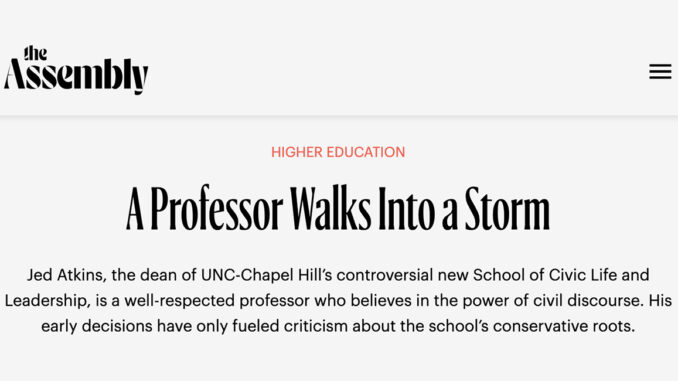
A recent story on UNC Chapel Hill’s pioneering new School of Civic Life and Leadership by The Assembly, a left-leaning online magazine, missed an opportunity to explain to its readers what the program teaches, what students learn and what those students think about it.
Instead of illuminating the pro-democracy program’s academic content, The Assembly’s 3,000-plus-word story followed the lead of other news media in obsessing over process, impugning participants’ motives and highlighting the school’s origins — while getting that wrong.
The Assembly story asserts at the top that SCiLL was “launched at the behest of the UNC-CH Board of Trustees and the state legislature.” That’s false, as is well-documented elsewhere.
As former Chancellor Kevin Guskiewicz explained to Carolina’s accreditor in March 2023, SCiLL’s origins involved the faculty and date at least to 2018, five years before the BOT adopted a resolution endorsing the administration’s civics-education proposal and urging its acceleration.
“It is worth noting that, though we are still very much in the beginning of the process, the work regarding the curriculum expansion for the Program for Public Discourse derives from planning, conversations, discussions with faculty leaders, and site visits dating back to February 2018,” Guskiewicz wrote. “This planning included a site visit by senior leaders to the campus of Arizona State University in 2018 to learn about their School of Economic Thought and Leadership, among other objectives.”
Curiously, The Assembly omitted this definitive history. The truth is that SCiLL evolved gradually from PPD, it has been a long time coming, and North Carolina and America need it.
Director Jed Atkins frames the school’s purpose perfectly: “Preparing students for the responsibilities of citizenship and civic leadership by fostering a free-speech culture; providing an education grounded in encouraging the human search for meaning; developing the capacities for civil discourse and wise decision-making; and understanding the history, institutions, and values of the American political tradition.”
Yet instead of showing how SCiLL tries to fulfill that noble mission, The Assembly warned its readers darkly that “at least half of the current SCiLL faculty attended theological schools or have research interests involving Christianity.”
This puts them in dangerous league with such right-wing radicals as Reinhold Niebuhr, Martin Luther King Jr. and Jimmy Carter.
Worse still, apparently, Atkins and his wife homeschooled their children, joining a broad national movement that began in the 1970s among counterculture liberals.
Mercy! Will SCiLL’s antireligious inquisitors next publish an investigation into the national overrepresentation of Jewish professors of law, medicine, science, history and finance? Or Islam’s disproportionate role in advancing science and math? Or perhaps expose the startling existence of Carolina’s Center for Jewish Studies or its Center for Middle East and Islamic Studies?
Most alarming, however, is The Assembly’s downright frightful revelation that “Atkins studied Roman statesmen like Cicero.”
What on Earth is a professor of classical studies like Atkins doing studying ancient leaders, of all people? O tempora! O mores!
We must put a stop to this outrage at once!
Perrin Jones, a Charlotte anesthesiologist, is a member of the UNC Chapel Hill Board of Trustees.



